- Home
- H. P. Lovecraft
The Road to Madness Page 36
The Road to Madness Read online
Page 36
“Complete specimens have such uncanny resemblance to certain creatures of primal myth that suggestion of ancient existence outside antarctic becomes inevitable. Dyer and Pabodie have read Necronomicon and seen Clark Ashton Smith’s nightmare paintings based on text, and will understand when I speak of Elder Things supposed to have created all earth life as jest or mistake. Students have always thought conception formed from morbid imaginative treatment of very ancient tropical radiata. Also like prehistoric folklore things Wilmarth has spoken of—Cthulhu cult appendages, etc.
“Vast field of study opened. Deposits probably of late Cretaceous or early Eocene period, judging from associated specimens. Massive stalagmites deposited above them. Hard work hewing out, but toughness prevented damage. State of preservation miraculous, evidently owing to limestone action. No more found so far, but will resume search later. Job now to get fourteen huge specimens to camp without dogs, which bark furiously and can’t be trusted near them.
“With nine men—three left to guard the dogs—we ought to manage the three sledges fairly well, though wind is bad. Must establish plane communication with McMurdo Sound and begin shipping material. But I’ve got to dissect one of these things before we take any rest. Wish I had a real laboratory here. Dyer better kick himself for having tried to stop my westward trip. First the world’s greatest mountains, and then this. If this last isn’t the high spot of the expedition, I don’t know what is. We’re made scientifically. Congrats, Pabodie, on the drill that opened up the cave. Now will Arkham please repeat description?”
The sensations of Pabodie and myself at receipt of this report were almost beyond description, nor were our companions much behind us in enthusiasm. McTighe, who had hastily translated a few high spots as they came from the droning receiving set, wrote out the entire message from his shorthand version as soon as Lake’s operator signed off. All appreciated the epoch-making significance of the discovery, and I sent Lake congratulations as soon as the Arkham’s operator had repeated back the descriptive parts as requested; and my example was followed by Sherman from his station at the McMurdo Sound supply cache, as well as by Captain Douglas of the Arkham. Later, as head of the expedition, I added some remarks to be relayed through the Arkham to the outside world. Of course, rest was an absurd thought amidst this excitement; and my only wish was to get to Lake’s camp as quickly as I could. It disappointed me when he sent word that a rising mountain gale made early aerial travel impossible.
But within an hour and a half interest again rose to banish disappointment. Lake, sending more messages, told of the completely successful transportation of the fourteen great specimens to the camp. It had been a hard pull, for the things were surprisingly heavy; but nine men had accomplished it very neatly. Now some of the party were hurriedly building a snow corral at a safe distance from the camp, to which the dogs could be brought for greater convenience in feeding. The specimens were laid out on the hard snow near the camp, save for one on which Lake was making crude attempts at dissection.
This dissection seemed to be a greater task than had been expected, for, despite the heat of a gasoline stove in the newly raised laboratory tent, the deceptively flexible tissues of the chosen specimen—a powerful and intact one—lost nothing of their more than leathery toughness. Lake was puzzled as to how he might make the requisite incisions without violence destructive enough to upset all the structural niceties he was looking for. He had, it is true, seven more perfect specimens; but these were too few to use up recklessly unless the cave might later yield an unlimited supply. Accordingly he removed the specimen and dragged in one which, though having remnants of the starfish arrangements at both ends, was badly crushed and partly disrupted along one of the great torso furrows.
Results, quickly reported over the wireless, were baffling and provocative indeed. Nothing like delicacy or accuracy was possible with instruments hardly able to cut the anomalous tissue, but the little that was achieved left us all awed and bewildered. Existing biology would have to be wholly revised, for this thing was no product of any cell growth science knows about. There had been scarcely any mineral replacement, and despite an age of perhaps forty million years, the internal organs were wholly intact. The leathery, undeteriorative, and almost indestructible quality was an inherent attribute of the thing’s form of organization, and pertained to some paleogean cycle of invertebrate evolution utterly beyond our powers of speculation. At first all that Lake found was dry, but as the heated tent produced its thawing effect, organic moisture of pungent and offensive odor was encountered toward the thing’s uninjured side. It was not blood, but a thick, dark-green fluid apparently answering the same purpose. By the time Lake reached this stage, all thirty-seven dogs had been brought to the still uncompleted corral near the camp, and even at that distance set up a savage barking and show of restlessness at the acrid, diffusive smell.
Far from helping to place the strange entity, this provisional dissection merely deepened its mystery. All guesses about its external members had been correct, and on the evidence of these one could hardly hesitate to call the thing animal; but internal inspection brought up so many vegetable evidences that Lake was left hopelessly at sea. It had digestion and circulation, and eliminated waste matter through the reddish tubes of its starfish-shaped base. Cursorily, one would say that its respiration apparatus handled oxygen rather than carbon dioxide; and there were odd evidences of air-storage chambers and methods of shifting respiration from the external orifice to at least two other fully developed breathing systems—gills and pores. Clearly, it was amphibian, and probably adapted to long airless hibernation periods as well. Vocal organs seemed present in connection with the main respiratory system, but they presented anomalies beyond immediate solution. Articulate speech, in the sense of syllable utterance, seemed barely conceivable, but musical piping notes covering a wide range were highly probable. The muscular system was almost prematurely developed.
The nervous system was so complex and highly developed as to leave Lake aghast. Though excessively primitive and archaic in some respects, the thing had a set of ganglial centers and connectives arguing the very extremes of specialized development. Its five-lobed brain was surprisingly advanced, and there were signs of a sensory equipment, served in part through the wiry cilia of the head, involving factors alien to any other terrestrial organism. Probably it has more than five senses, so that its habits could not be predicted from any existing analogy. It must, Lake thought, have been a creature of keen sensitiveness and delicately differentiated functions in its primal world—much like the ants and bees of today. It reproduced like the vegetable crytogams, especially the Pteridophyta, having spore cases at the tips of the wings and evidently developing from a thallus or prothallus.
But to give it a name at this stage was mere folly. It looked like a radiate, but was clearly something more. It was partly vegetable, but had three-fourths of the essentials of animal structure. That it was marine in origin, its symmetrical contour and certain other attributes clearly indicated; yet one could not be exact as to the limit of its later adaptations. The wings, after all, held a persistent suggestion of the aerial. How it could have undergone its tremendously complex evolution on a new-born earth in time to leave prints in Archaean rocks was so far beyond conception as to make Lake whimsically recall the primal myths about Great Old Ones who filtered down from the stars and concocted earth life as a joke or mistake; and the wild tales of cosmic hill things from outside told by a folklorist colleague in Miskatonic’s English department.
Naturally, he considered the possibility of the pre-Cambrian prints having been made by a less evolved ancestor of the present specimens, but quickly rejected this too-facile theory upon considering the advanced structural qualities of the older fossils. If anything, the later contours showed decadence rather than higher evolution. The size of the pseudofeet had decreased, and the whole morphology seemed coarsened and simplified. Moreover, the nerves and organs just examined held singular sug
gestions of retrogression from forms still more complex. Atrophied and vestigial parts were surprisingly prevalent. Altogether, little could be said to have been solved; and Lake fell back on mythology for a provisional name—jocosely dubbing his finds “The Elder Ones.”
At about 2:30 A.M., having decided to postpone further work and get a little rest, he covered the dissected organism with a tarpaulin, emerged from the laboratory tent, and studied the intact specimens with renewed interest. The ceaseless antarctic sun had begun to limber up their tissues a trifle, so that the head points and tubes of two or three showed signs of unfolding; but Lake did not believe there was any danger of immediate decomposition in the almost subzero air. He did, however, move all the undissected specimens close together and throw a spare tent over them in order to keep off the direct solar rays. That would also help to keep their possible scent away from the dogs, whose hostile unrest was really becoming a problem, even at their substantial distance and behind the higher and higher snow walls which an increased quota of the men were hastening to raise around their quarters. He had to weight down the corners of the tent cloth with heavy blocks of snow to hold it in place amidst the rising gale, for the titan mountains seemed about to deliver some gravely severe blasts. Early apprehensions about sudden antarctic winds were revived, and under Atwood’s supervision precautions were taken to bank the tents, new dog corral, and crude aeroplane shelters with snow on the mountainward side. These latter shelters, begun with hard snow blocks during odd moments, were by no means as high as they should have been; and Lake finally detached all hands from other tasks to work on them.
It was after four when Lake at last prepared to sign off and advised us all to share the rest period his outfit would take when the shelter walls were a little higher. He held some friendly chat with Pabodie over the ether, and repeated his praise of the really marvelous drills that had helped him make his discovery. Atwood also sent greetings and praises. I gave Lake a warm word of congratulations, owning up that he was right about the western trip, and we all agreed to get in touch by wireless at ten in the morning. If the gale was then over, Lake would send a plane for the party at my base. Just before retiring I dispatched a final message to the Arkham with instructions about toning down the day’s news for the outside world, since the full details seemed radical enough to rouse a wave of incredulity until further substantiated.
III
None of us, I imagine, slept very heavily or continuously that morning. Both the excitement of Lake’s discovery and the mounting fury of the wind were against such a thing. So savage was the blast, even where we were, that we could not help wondering how much worse it was at Lake’s camp, directly under the vast unknown peaks that bred and delivered it. McTighe was awake at ten o’clock and tried to get Lake on the wireless, as agreed, but some electrical condition in the disturbed air to the westward seemed to prevent communication. We did, however, get the Arkham, and Douglas told me that he had likewise been vainly trying to reach Lake. He had not known about the wind, for very little was blowing at McMurdo Sound, despite its persistent rage where we were.
Throughout the day we all listened anxiously and tried to get Lake at intervals, but invariably without results. About noon a positive frenzy of wind stampeded out of the west, causing us to fear for the safety of our camp; but it eventually died down, with only a moderate relapse at 2 P.M. After three o’clock it was very quiet, and we redoubled our efforts to get Lake. Reflecting that he had four planes, each provided with an excellent short-wave outfit, we could not imagine any ordinary accident capable of crippling all his wireless equipment at once. Nevertheless the stony silence continued, and when we thought of the delirious force the wind must have had in his locality we could not help making the more direful conjectures.
By six o’clock our fears had become intense and definite, and after a wireless consultation with Douglas and Thorfinnssen I resolved to take steps toward investigation. The fifth aeroplane, which we had left at the McMurdo Sound supply cache with Sherman and two sailors, was in good shape and ready for instant use, and it seemed that the very emergency for which it had been saved was now upon us. I got Sherman by wireless and ordered him to join me with the plane and the two sailors at the southern base as quickly as possible, the air conditions being apparently highly favorable. We then talked over the personnel of the coming investigation party, and decided that we would include all hands, together with the sledge and dogs which I had kept with me. Even so great a load would not be too much for one of the huge planes built to our special orders for heavy machinery transportation. At intervals I still tried to reach Lake with the wireless, but all to no purpose.
Sherman, with the sailors Gunnarsson and Larsen, took off at 7:30; and reported a quiet flight from several points on the wing. They arrived at our base at midnight, and all hands at once discussed the next move. It was risky business sailing over the antarctic in a single aeroplane without any line of bases, but no one drew back from what seemed like the plainest necessity. We turned in at two o’clock for a brief rest after some preliminary loading of the plane, but were up again in four hours to finish the loading and packing.
At 7:15 A.M., January 25th, we started flying northwestward under McTighe’s pilotage with ten men, seven dogs, a sledge, a fuel and food supply, and other items including the plane’s wireless outfit. The atmosphere was clear, fairly quiet, and relatively mild in temperature, and we anticipated very little trouble in reaching the latitude and longitude designated by Lake as the site of his camp. Our apprehensions were over what we might find, or fail to find, at the end of our journey, for silence continued to answer all calls dispatched to the camp.
Every incident of that four-and-a-half-hour flight is burned into my recollection because of its crucial position in my life. It marked my loss, at the age of fifty-four, of all that peace and balance which the normal mind possesses through its accustomed conception of external nature and nature’s laws. Thenceforward the ten of us—but the student Danforth and myself above all others—were to face a hideously amplified world of lurking horrors which nothing can erase from our emotions, and which we would refrain from sharing with mankind in general if we could. The newspapers have printed the bulletins we sent from the moving plane, telling of our nonstop course, our two battles with treacherous upper-air gales, our glimpse of the broken surface where Lake had sunk his mid-journey shaft three days before, and our sight of a group of those strange fluffy snow cylinders noted by Amundsen and Byrd as rolling in the wind across the endless leagues of frozen plateau. There came a point, though, when our sensations could not be conveyed in any words the press would understand, and a latter point when we had to adopt an actual rule of strict censorship.
The sailor Larsen was first to spy the jagged line of witchlike cones and pinnacles ahead, and his shouts sent everyone to the windows of the great cabined plane. Despite our speed, they were very slow in gaining prominence; hence we knew that they must be infinitely far off, and visible only because of their abnormal height. Little by little, however, they rose grimly into the western sky; allowing us to distinguish various bare, bleak, blackish summits, and to catch the curious sense of fantasy which they inspired as seen in the reddish antarctic light against the provocative background of iridescent ice-dust clouds. In the whole spectacle there was a persistent, pervasive hint of stupendous secrecy and potential revelation. It was as if these stark, nightmare spires marked the pylons of a frightful gateway into forbidden spheres of dream, and complex gulfs of remote time, space, and ultradimensionality. I could not help feeling that they were evil things—mountains of madness whose farther slopes looked out over some accursed ultimate abyss. That seething, half-luminous cloud background held ineffable suggestions of a vague, ethereal beyondness far more than terrestrially spatial, and gave appalling reminders of the utter remoteness, separateness, desolation, and aeon-long death of this untrodden and unfathomed austral world.
It was young Danforth who drew our not
ice to the curious regularities of the higher mountain skyline—regularities like clinging fragments of perfect cubes, which Lake had mentioned in his messages, and which indeed justified his comparison with the dreamlike suggestions of primordial temple ruins, on cloudy Asian mountaintops so subtly and strangely painted by Roerich. There was indeed something hauntingly Roerich-like about this whole unearthly continent of mountainous mystery. I had felt it in October when we first caught sight of Victoria Land, and I felt it afresh now. I felt, too, another wave of uneasy consciousness of Archaean mythical resemblances; of how disturbingly this lethal realm corresponded to the evilly famed plateau of Leng in the primal writings. Mythologists have placed Leng in Central Asia; but the racial memory of man—or of his predecessors—is long, and it may well be that certain tales have come down from lands and mountains and temples of horror earlier than Asia and earlier than any human world we know. A few daring mystics have hinted at a pre-Pleistocene origin for the fragmentary Pnakotic Manuscripts, and have suggested that the devotees of Tsathoggua were as alien to mankind as Tsathoggua itself. Leng, wherever in space or time it might brood, was not a region I would care to be in or near, nor did I relish the proximity of a world that had ever bred such ambiguous and Archaean monstrosities as those Lake had just mentioned. At the moment I felt sorry that I had ever read the abhorred Necronomicon, or talked so much with that unpleasantly erudite folklorist Wilmarth at the university.
This mood undoubtedly served to aggravate my reaction to the bizarre mirage which burst upon us from the increasingly opalescent zenith as we drew near the mountains and began to make out the cumulative undulations of the foothills. I had seen dozens of polar mirages during the preceding weeks, some of them quite as uncanny and fantastically vivid as the present example; but this one had a wholly novel and obscure quality of menacing symbolism, and I shuddered as the seething labyrinth of fabulous walls and towers and minarets loomed out of the troubled ice vapors above our heads.

 The Best of H.P. Lovecraft
The Best of H.P. Lovecraft The Definitive H.P. Lovecraft: 67 Tales Of Horror In One Volume
The Definitive H.P. Lovecraft: 67 Tales Of Horror In One Volume The Complete Works of H.P. Lovecraft
The Complete Works of H.P. Lovecraft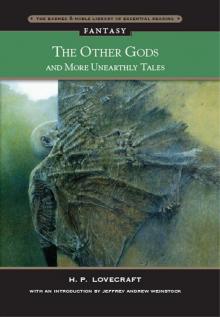 Other Gods and More Unearthly Tales
Other Gods and More Unearthly Tales Lovecraft's Fiction Volume I, 1905-1925
Lovecraft's Fiction Volume I, 1905-1925 The Shadow Out of Time
The Shadow Out of Time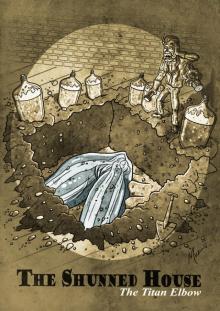 The Shunned House
The Shunned House Lovecraft's Fiction Volume II, 1926-1928
Lovecraft's Fiction Volume II, 1926-1928 The Thing on the Doorstep and Other Weird Stories
The Thing on the Doorstep and Other Weird Stories Dream Cycle of H. P. Lovecraft: Dreams of Terror and Death
Dream Cycle of H. P. Lovecraft: Dreams of Terror and Death Great Tales of Horror
Great Tales of Horror Shadows of Death
Shadows of Death Delphi Complete Works of H. P. Lovecraft (Illustrated)
Delphi Complete Works of H. P. Lovecraft (Illustrated) Waking Up Screaming: Haunting Tales of Terror
Waking Up Screaming: Haunting Tales of Terror H.P. Lovecraft Goes to the Movies
H.P. Lovecraft Goes to the Movies The Road to Madness
The Road to Madness The Complete H.P. Lovecraft Reader (68 Stories)
The Complete H.P. Lovecraft Reader (68 Stories) The Horror in the Museum
The Horror in the Museum Collected Fiction Volume 1 (1905-1925): A Variorum Edition
Collected Fiction Volume 1 (1905-1925): A Variorum Edition Lovecrafts_Fiction, vol.I_1905-1925
Lovecrafts_Fiction, vol.I_1905-1925 Writings in the United Amateur, 1915-1922
Writings in the United Amateur, 1915-1922 H.P. Lovecraft: The Complete Works
H.P. Lovecraft: The Complete Works Collected Fiction Volume 3 (1931-1936): A Variorum Edition
Collected Fiction Volume 3 (1931-1936): A Variorum Edition H.P. Lovecraft: The Complete Fiction
H.P. Lovecraft: The Complete Fiction Collected Fiction Volume 2 (1926-1930): A Variorum Edition
Collected Fiction Volume 2 (1926-1930): A Variorum Edition Yog Sothothery - The Definitive H.P. Lovecraft Anthology
Yog Sothothery - The Definitive H.P. Lovecraft Anthology The Complete H.P. Lovecraft Collection (Xist Classics)
The Complete H.P. Lovecraft Collection (Xist Classics)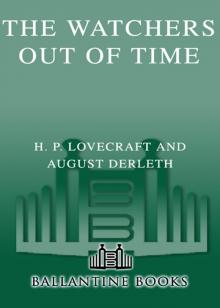 The Watchers Out of Time
The Watchers Out of Time Eldritch Tales
Eldritch Tales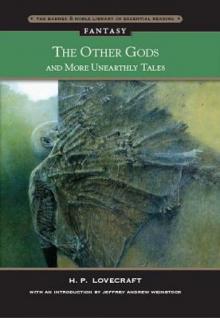 The Other Gods And More Unearthly Tales
The Other Gods And More Unearthly Tales The New Annotated H. P. Lovecraft
The New Annotated H. P. Lovecraft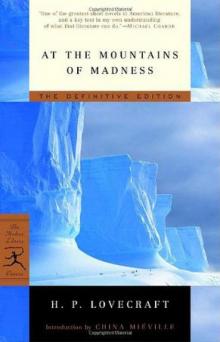 At the mountains of madness
At the mountains of madness Bloodcurdling Tales of Horror and the Macabre
Bloodcurdling Tales of Horror and the Macabre Fossil Lake II: The Refossiling
Fossil Lake II: The Refossiling Shadows of Carcosa: Tales of Cosmic Horror by Lovecraft, Chambers, Machen, Poe, and Other Masters of the Weird
Shadows of Carcosa: Tales of Cosmic Horror by Lovecraft, Chambers, Machen, Poe, and Other Masters of the Weird H. P. Lovecraft
H. P. Lovecraft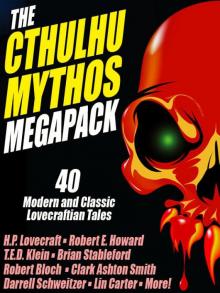 The Cthulhu Mythos Megapack
The Cthulhu Mythos Megapack The Complete H. P. Lovecraft Reader (2nd Edition)
The Complete H. P. Lovecraft Reader (2nd Edition) The Complete Fiction
The Complete Fiction Waking Up Screaming
Waking Up Screaming Transition of H. P. Lovecraft
Transition of H. P. Lovecraft![[1935] The Shadow Out of Time Read online](http://i1.bookreadfree.com/i2/04/12/1935_the_shadow_out_of_time_preview.jpg) [1935] The Shadow Out of Time
[1935] The Shadow Out of Time The Horror Megapack
The Horror Megapack